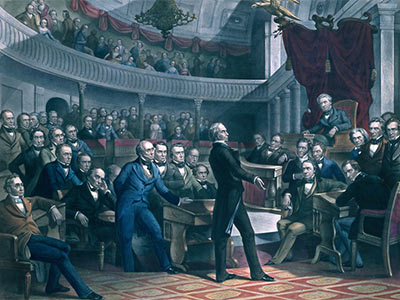Breaking the Rules to Change the Rules
The price of the Senate's November "nuclear option" move is growing clear.
 Obstruction invites destruction. In one of its most self-destructive acts, last November a frustrated U.S. Senate employed a highly questionable maneuver to obliterate a time-honored tradition. By a simple majority, instead of the sixty-seven votes specified by the written rules, it changed the requirement for shutting off extended debate, the so-called filibuster that protects the rights of the minority. As Michigan senator Carl Levin, one of three Democrats to oppose the change, put it, the Senate “was willing to break the rules to change the rules.” Provoked by mounting irritation with Republican delaying tactics, the Democratic majority used a complicated tactic to evade the rule requiring sixty votes to close off debate.
Obstruction invites destruction. In one of its most self-destructive acts, last November a frustrated U.S. Senate employed a highly questionable maneuver to obliterate a time-honored tradition. By a simple majority, instead of the sixty-seven votes specified by the written rules, it changed the requirement for shutting off extended debate, the so-called filibuster that protects the rights of the minority. As Michigan senator Carl Levin, one of three Democrats to oppose the change, put it, the Senate “was willing to break the rules to change the rules.” Provoked by mounting irritation with Republican delaying tactics, the Democratic majority used a complicated tactic to evade the rule requiring sixty votes to close off debate.
The precedent thus set has already proven counterproductive. The partisan divide has been inflamed. Republicans are employing every available option to impede Senate operations. Far more dangerously, it lays the groundwork for future Senate majorities to override the protections minorities have historically enjoyed.
Senator Lamar Alexander (R-TN) was eloquent in explaining why the change is so troubling. He characterized it as “the most stunning development in the history of the Senate …rules”. He also highlighted Levin’s reference to the 1949 observation of Arthur Vandenberg, a Republican from Michigan, that “if a majority of the Senate can change its rules at any time, there are no rules”. Although the tactic has so far only applied to executive and judicial nominations (except for Supreme Court nominations), if left unchallenged it will surely tempt future majorities to broaden its application to legislation in general. There is already talk among some Democratic Senators that the rule should also be further relaxed, if not abolished.
Should that trend prevail, the Senate—Ben Franklin’s saucer to cool the hot tea coming out of the House—will no longer exist. The Senate will be a virtual mirror of the lower chamber where the majority controls everything and the minority often can only make speeches. In today's House, Alexis de Tocqueville’s warning about the tyranny of the majority is already apt. While the Senate's practice of unfettered debate is exasperating, extended debate permits deeper thought and a broader consensus to emerge that produces better legislation.
To forestall the danger this precedent portends, two initiatives are essential: first, a clear, emphatic affirmation by a strong bipartisan majority that this precedent will not govern future Senate procedure and, second, a fresh approach to curbing filibusters by a rational adjustment of the cloture rule. The latter is needed to pave the way for the former. What form might a change in cloture take?
Here the Senate has other precedents to follow. The modern cloture rule was adopted in 1917 and has been modified several times, notably in 1975 when the requirement was reduced from sixty-seven to sixty votes in the one-hundred-member chamber. An earlier episode suggests a way out of the current crisis in Senate procedures.
In 1968 Majority Leader Mike Mansfield (D-MT), supported by Minority Leader Everett Dirksen (R-IL), kept debate going through an unprecedented four cloture votes on the Mondale-Brooke Fair Housing legislation. Step-by-step, vote-by-vote, the sixty-seven votes (which were then necessary) materialized and the 1968 Civil Rights Act passed the Senate.
The Senate could build on that experience by adopting a sliding scale that would test whether a trend toward cloture is developing. If a second vote to end debate demonstrated rising support for cloture, the requirement for approval might drop from the current sixty to fifty-eight on a third vote. This new standard would afford ample opportunity to persuade additional senators to support cloture and thus reach the merits of the proposed nomination or legislation. Should these test votes not establish that support for cloture was growing, the measure would be pulled from the floor and the Senate would move to other business.
A bipartisan initiative to modify the cloture rule in this way should be coupled with explicit commitment that evasive tactics relying on a simple majority to change the rules will not be repeated. Otherwise the precedent set last November will lurk as a sinister threat to change any rule at any time as happens to suit the political interests of the majority.
The late Senator Robert Byrd was fond of quoting Vice President Adlai Stevenson’s farewell speech in 1897. The Senate, Stevenson said, “wisely fixes the limits to its own power” by rules that “render stable and secure, the rights and liberties which have been achieved by conflict”.
To preserve those rights and our liberties, the Senate should return to regular order—and soon.
Alton Frye, Presidential Senior Fellow Emeritus of the Council on Foreign Relations, was Staff Director for Senator Edward Brooke (R-MA) and a longtime adviser to former Majority Leader Howard Baker (R-TN)
Jeffrey H. Smith, a partner at Arnold & Porter, LLP, was General Counsel of the Senate Armed Services Committee under Senator Sam Nunn (D-GA) and General Counsel of CIA in 1995-1996.
